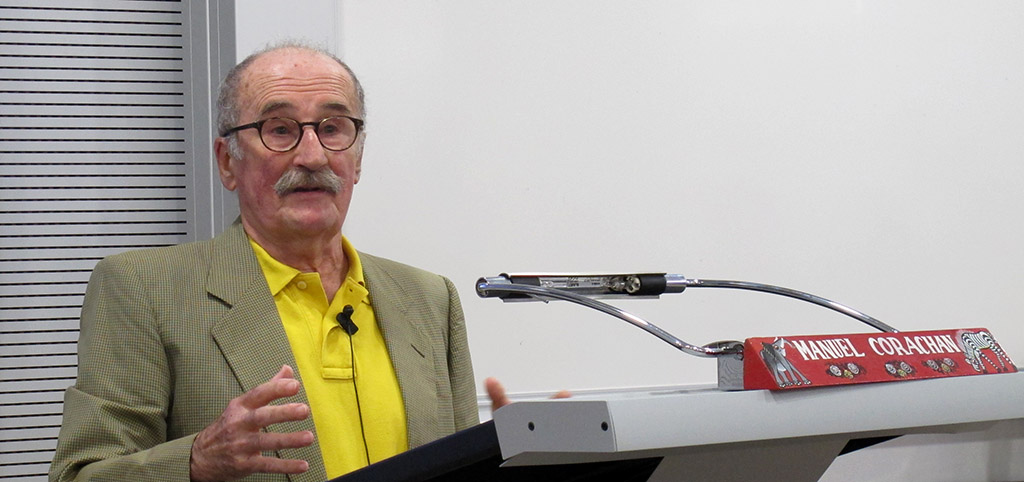Classroom Named for a Pioneer: Manuel Corachán
ISGlobal and the UB inaugurate a state-of-the-art lecture hall at the close of this year’s Master of Global Health
26.06.2017
It just so happened that last Friday was both a beginning and an end. A beginning because the lecture hall known as Room 15 in the Faculty of Medicine and Health Sciences at the University of Barcelona was given a new name: Manuel Corachán. The Barcelona Institute for Global Health (ISGlobal) had decided that the lecture hall where nearly all of its educational programmes are taught deserved to be named after a pioneer in international health, one of the doctors who has shaped the tropical health specialty in Spain since its beginnings in the 1970s. “Manuel Corachán created Spain’s first degree programme in tropical medicine and international health,” explained Núria Casamitjana, ISGlobal’s Training and Education Director.
Corachán himself commented: “I look forward to seeing subjects that are absolutely essential in today’s globalised world being taught in this classroom for international health, tropical health and planetary health.” The lecture hall recently remodeled and equipped to meet the needs of education in the 21st century is, according to Antoni Trilla, Vice-Dean of the Faculty of Medicine and Health Sciences at the University of Barcelona, as “modern” and “an example for others to follow”.
With the help of photos and anecdotes, Corachán described the passion that prompted him to open up a new path that had not existed before. After practising medicine in Ghana, Tanzania and Papua New Guinea, he returned to the Hospital Clínic in Barcelona, where he founded Spain’s first Tropical Medicine Unit. There, he worked alongside professionals such as Pedro Alonso, Joaquim Gascón and Núria Casamitjana, who shared his motivation and the vision of combining clinical practice with research, training and fieldwork. This vision later became a reality when the Hospital Clínic and the University of Barcelona founded the Manhiça Health Research Centre (CISM) in Mozambique, thus laying the groundwork for today’s ISGlobal.
“What is needed is a vision that engages with the interconnected and interdependent world we live in,” commented Antoni Plasència, Director General of ISGlobal. “Pedro Alonso, Clara Menéndez and Manuel Corachán understood that.” He also stressed the importance of forming alliances with institutions, governments and organisations in order to pool the best abilities of each entity.
Ignasi López, Director of the Department of Science at the ”la Caixa” Banking Foundation, commented: “It is impossible for us here in Spain to get an overall view of the challenges facing global health; a broader view was needed and that led to our collaboration with ISGlobal.” López reiterated the foundation’s commitment to the three pillars of ISGlobal’s activity: research, training and knowledge translation.
Closing Session of the 2016-2017 Academic Year
The opening event coincided with the close of the 2016-2017 academic year for the Master of Global Health and Master of Clinical Research (International Health track) and these students had the privilege of being the first to use the new Manuel Corachán lecture hall. Diplomas in hand, five students representing the two programmes extended words of thanks to the professors, the training team, the Faculty of Medicine and Health Sciences, and ISGlobal. They talked about the importance of the connections and relationships they had established over the year-long course and the passion for global health—shared by people from across the globe with vastly different backgrounds—that inspires them to tackle the challenges of the future. With these remarks, the students took up the challenge issued by Antoni Plasència a few minutes earlier: “You represent a bridge to the future and a commitment to global health and probably in the future to planetary health.”

2016-2017 academic year for the Master of Global Health and Master of Clinical Research (International Health track)
Looking to the next academic year, ISGlobal offers two scholarships for Master in Global Health to students from Sub-Saharan Africa committed to global health and to the advancement of their communities. Additionally, the Master in Clinical Research (International Health track) will be offered entirely in English in order to satisfy the demand for a Master programme that provides a springboard to an international career.



